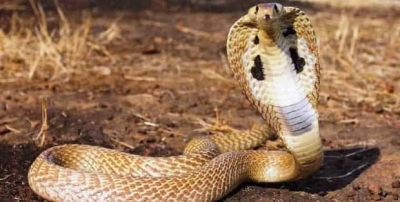
The Indian cobra (Naja naja), also known as the spectacled cobra, Asian cobra, or binocellate cobra, is a species of the genus Naja found, in India, Pakistan, Bangladesh, Sri Lanka, Nepal, and Bhutan, and a member of the “big four” species that inflict the most snakebites on humans in India. It is distinct from the king cobra which belongs to the monotypic genus Ophiophagus. The Indian cobra is revered in Indian mythology and culture, and is often seen with snake charmers. It is now protected in India under the Indian Wildlife Protection Act (1972).
Naja naja is considered to be the prototypical cobra species within the subgenus Naja, and within the entire genus Naja. All Asiatic species of Naja were considered conspecific with Naja naja until the 1990s, often as subspecies thereof. Many of the subspecies were later found to be artificial or composites. This causes much potential confusion when interpreting older literature.
The Indian cobra varies tremendously in colour and pattern throughout its range. The ventral scales or the underside colouration of this species can be grey, yellow, tan, brown, reddish or black. Dorsal scales of the Indian cobra may have a hood mark or colour patterns. The most common visible pattern is a posteriorly convex light band at the level of the 20th to 25th ventrals. Salt-and-pepper speckles, especially in adult specimens, are seen on the dorsal scales.
Specimens, particularly those found in Sri Lanka, may exhibit poorly defined banding on the dorsum. Ontogenetic colour change is frequently observed in specimens in the northwestern parts of their geographic range (southern Pakistan and northwestern India). In southern Pakistan, juvenile specimens may be grey in colour and may or may not have a hood mark. Adults on the other hand are typically uniformly black in colour on top (melanistic), while the underside, outside the throat region, is usually light.
Picture Credit : Google



